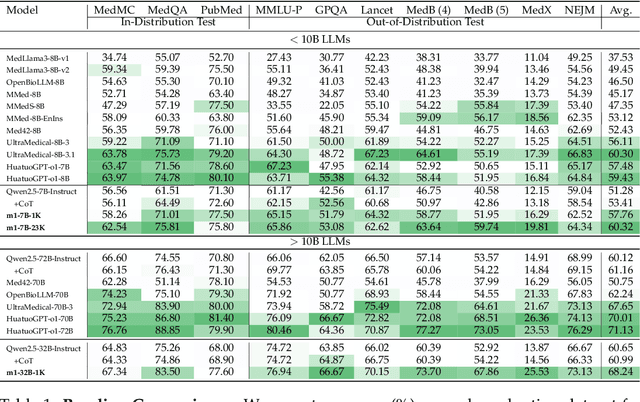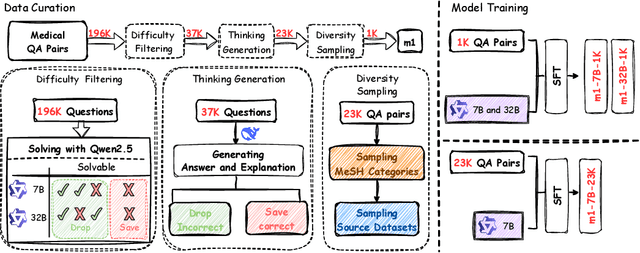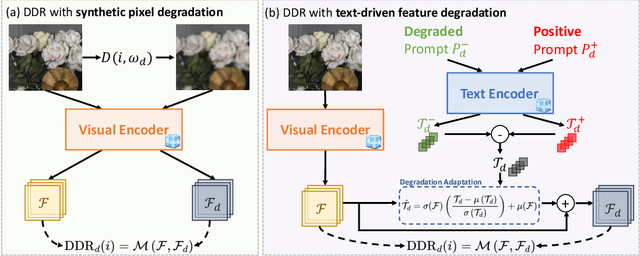Juncheng Wu
All You Need Are Random Visual Tokens? Demystifying Token Pruning in VLLMs
Dec 08, 2025Abstract:Vision Large Language Models (VLLMs) incur high computational costs due to their reliance on hundreds of visual tokens to represent images. While token pruning offers a promising solution for accelerating inference, this paper, however, identifies a key observation: in deeper layers (e.g., beyond the 20th), existing training-free pruning methods perform no better than random pruning. We hypothesize that this degradation is caused by "vanishing token information", where visual tokens progressively lose their salience with increasing network depth. To validate this hypothesis, we quantify a token's information content by measuring the change in the model output probabilities upon its removal. Using this proposed metric, our analysis of the information of visual tokens across layers reveals three key findings: (1) As layers deepen, the information of visual tokens gradually becomes uniform and eventually vanishes at an intermediate layer, which we term as "information horizon", beyond which the visual tokens become redundant; (2) The position of this horizon is not static; it extends deeper for visually intensive tasks, such as Optical Character Recognition (OCR), compared to more general tasks like Visual Question Answering (VQA); (3) This horizon is also strongly correlated with model capacity, as stronger VLLMs (e.g., Qwen2.5-VL) employ deeper visual tokens than weaker models (e.g., LLaVA-1.5). Based on our findings, we show that simple random pruning in deep layers efficiently balances performance and efficiency. Moreover, integrating random pruning consistently enhances existing methods. Using DivPrune with random pruning achieves state-of-the-art results, maintaining 96.9% of Qwen-2.5-VL-7B performance while pruning 50% of visual tokens. The code will be publicly available at https://github.com/YahongWang1/Information-Horizon.
MedFrameQA: A Multi-Image Medical VQA Benchmark for Clinical Reasoning
May 22, 2025Abstract:Existing medical VQA benchmarks mostly focus on single-image analysis, yet clinicians almost always compare a series of images before reaching a diagnosis. To better approximate this workflow, we introduce MedFrameQA -- the first benchmark that explicitly evaluates multi-image reasoning in medical VQA. To build MedFrameQA both at scale and in high-quality, we develop 1) an automated pipeline that extracts temporally coherent frames from medical videos and constructs VQA items whose content evolves logically across images, and 2) a multiple-stage filtering strategy, including model-based and manual review, to preserve data clarity, difficulty, and medical relevance. The resulting dataset comprises 2,851 VQA pairs (gathered from 9,237 high-quality frames in 3,420 videos), covering nine human body systems and 43 organs; every question is accompanied by two to five images. We comprehensively benchmark ten advanced Multimodal LLMs -- both proprietary and open source, with and without explicit reasoning modules -- on MedFrameQA. The evaluation challengingly reveals that all models perform poorly, with most accuracies below 50%, and accuracy fluctuates as the number of images per question increases. Error analysis further shows that models frequently ignore salient findings, mis-aggregate evidence across images, and propagate early mistakes through their reasoning chains; results also vary substantially across body systems, organs, and modalities. We hope this work can catalyze research on clinically grounded, multi-image reasoning and accelerate progress toward more capable diagnostic AI systems.
STAR-1: Safer Alignment of Reasoning LLMs with 1K Data
Apr 02, 2025Abstract:This paper introduces STAR-1, a high-quality, just-1k-scale safety dataset specifically designed for large reasoning models (LRMs) like DeepSeek-R1. Built on three core principles -- diversity, deliberative reasoning, and rigorous filtering -- STAR-1 aims to address the critical needs for safety alignment in LRMs. Specifically, we begin by integrating existing open-source safety datasets from diverse sources. Then, we curate safety policies to generate policy-grounded deliberative reasoning samples. Lastly, we apply a GPT-4o-based safety scoring system to select training examples aligned with best practices. Experimental results show that fine-tuning LRMs with STAR-1 leads to an average 40% improvement in safety performance across four benchmarks, while only incurring a marginal decrease (e.g., an average of 1.1%) in reasoning ability measured across five reasoning tasks. Extensive ablation studies further validate the importance of our design principles in constructing STAR-1 and analyze its efficacy across both LRMs and traditional LLMs. Our project page is https://ucsc-vlaa.github.io/STAR-1.
MedReason: Eliciting Factual Medical Reasoning Steps in LLMs via Knowledge Graphs
Apr 01, 2025



Abstract:Medical tasks such as diagnosis and treatment planning require precise and complex reasoning, particularly in life-critical domains. Unlike mathematical reasoning, medical reasoning demands meticulous, verifiable thought processes to ensure reliability and accuracy. However, there is a notable lack of datasets that provide transparent, step-by-step reasoning to validate and enhance the medical reasoning ability of AI models. To bridge this gap, we introduce MedReason, a large-scale high-quality medical reasoning dataset designed to enable faithful and explainable medical problem-solving in large language models (LLMs). We utilize a structured medical knowledge graph (KG) to convert clinical QA pairs into logical chains of reasoning, or ``thinking paths'', which trace connections from question elements to answers via relevant KG entities. Each path is validated for consistency with clinical logic and evidence-based medicine. Our pipeline generates detailed reasoning for various medical questions from 7 medical datasets, resulting in a dataset of 32,682 question-answer pairs, each with detailed, step-by-step explanations. Experiments demonstrate that fine-tuning with our dataset consistently boosts medical problem-solving capabilities, achieving significant gains of up to 7.7% for DeepSeek-Ditill-8B. Our top-performing model, MedReason-8B, outperforms the Huatuo-o1-8B, a state-of-the-art medical reasoning model, by up to 4.2% on the clinical benchmark MedBullets. We also engage medical professionals from diverse specialties to assess our dataset's quality, ensuring MedReason offers accurate and coherent medical reasoning. Our data, models, and code will be publicly available.
m1: Unleash the Potential of Test-Time Scaling for Medical Reasoning with Large Language Models
Apr 01, 2025



Abstract:Test-time scaling has emerged as a powerful technique for enhancing the reasoning capabilities of large language models. However, its effectiveness in medical reasoning remains uncertain, as the medical domain fundamentally differs from mathematical tasks in terms of knowledge representation and decision-making processes. In this paper, we provide the first comprehensive investigation of test-time scaling for medical reasoning and present m1, a simple yet effective approach that increases a model's medical reasoning capability at inference. Our evaluation across diverse medical tasks demonstrates that test-time scaling consistently enhances medical reasoning, enabling lightweight fine-tuned models under 10B parameters to establish new state-of-the-art performance, while our 32B model rivals previous 70B-scale medical LLMs. However, we identify an optimal reasoning token budget of approximately 4K, beyond which performance may degrade due to overthinking. Budget forcing, which extends test-time computation through iterative prompts, helps models double-check answers but does not necessarily improve the overall medical QA performance and, in some cases, even introduces errors into previously correct responses. Our case-by-case analysis identifies insufficient medical knowledge as a key bottleneck that prevents further performance gains through test-time scaling. We find that increasing data scale, improving data quality, and expanding model capacity consistently enhance medical knowledge grounding, enabling continued performance improvements, particularly on challenging medical benchmarks where smaller models reach saturation. These findings underscore fundamental differences between medical and mathematical reasoning in LLMs, highlighting that enriched medical knowledge, other than increased reasoning depth alone, is essential for realizing the benefits of test-time scaling.
MedTrinity-25M: A Large-scale Multimodal Dataset with Multigranular Annotations for Medicine
Aug 06, 2024Abstract:This paper introduces MedTrinity-25M, a comprehensive, large-scale multimodal dataset for medicine, covering over 25 million images across 10 modalities, with multigranular annotations for more than 65 diseases. These enriched annotations encompass both global textual information, such as disease/lesion type, modality, region-specific descriptions, and inter-regional relationships, as well as detailed local annotations for regions of interest (ROIs), including bounding boxes, segmentation masks. Unlike existing approach which is limited by the availability of image-text pairs, we have developed the first automated pipeline that scales up multimodal data by generating multigranular visual and texual annotations (in the form of image-ROI-description triplets) without the need for any paired text descriptions. Specifically, data from over 90 different sources have been collected, preprocessed, and grounded using domain-specific expert models to identify ROIs related to abnormal regions. We then build a comprehensive knowledge base and prompt multimodal large language models to perform retrieval-augmented generation with the identified ROIs as guidance, resulting in multigranular texual descriptions. Compared to existing datasets, MedTrinity-25M provides the most enriched annotations, supporting a comprehensive range of multimodal tasks such as captioning and report generation, as well as vision-centric tasks like classification and segmentation. Pretraining on MedTrinity-25M, our model achieves state-of-the-art performance on VQA-RAD and PathVQA, surpassing both multimodal large language models and other representative SoTA approaches. This dataset can also be utilized to support large-scale pre-training of multimodal medical AI models, contributing to the development of future foundation models in the medical domain.
DDR: Exploiting Deep Degradation Response as Flexible Image Descriptor
Jun 12, 2024



Abstract:Image deep features extracted by pre-trained networks are known to contain rich and informative representations. In this paper, we present Deep Degradation Response (DDR), a method to quantify changes in image deep features under varying degradation conditions. Specifically, our approach facilitates flexible and adaptive degradation, enabling the controlled synthesis of image degradation through text-driven prompts. Extensive evaluations demonstrate the versatility of DDR as an image descriptor, with strong correlations observed with key image attributes such as complexity, colorfulness, sharpness, and overall quality. Moreover, we demonstrate the efficacy of DDR across a spectrum of applications. It excels as a blind image quality assessment metric, outperforming existing methodologies across multiple datasets. Additionally, DDR serves as an effective unsupervised learning objective in image restoration tasks, yielding notable advancements in image deblurring and single-image super-resolution. Our code will be made available.
Misalignment-Robust Frequency Distribution Loss for Image Transformation
Feb 28, 2024Abstract:This paper aims to address a common challenge in deep learning-based image transformation methods, such as image enhancement and super-resolution, which heavily rely on precisely aligned paired datasets with pixel-level alignments. However, creating precisely aligned paired images presents significant challenges and hinders the advancement of methods trained on such data. To overcome this challenge, this paper introduces a novel and simple Frequency Distribution Loss (FDL) for computing distribution distance within the frequency domain. Specifically, we transform image features into the frequency domain using Discrete Fourier Transformation (DFT). Subsequently, frequency components (amplitude and phase) are processed separately to form the FDL loss function. Our method is empirically proven effective as a training constraint due to the thoughtful utilization of global information in the frequency domain. Extensive experimental evaluations, focusing on image enhancement and super-resolution tasks, demonstrate that FDL outperforms existing misalignment-robust loss functions. Furthermore, we explore the potential of our FDL for image style transfer that relies solely on completely misaligned data. Our code is available at: https://github.com/eezkni/FDL
 Add to Chrome
Add to Chrome Add to Firefox
Add to Firefox Add to Edge
Add to Edge